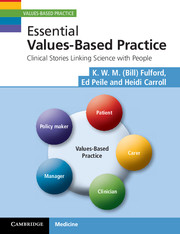Book contents
- Frontmatter
- Review quotes
- Contents
- Foreword
- Acknowledgements
- A bold claim to start this book
- Prologue: linking science with people
- Part 1 Values, individuals and an overview of values-based practice
- Part 2 The clinical skills for values-based practice
- Part 3 Relationships in values-based practice
- Part 4 Science and values-based practice
- 10 The reluctant hypertensive: think evidence, think values too!
- 11 Unexplainabl abdominal pain: think values, think evidence too!
- 12 Elective fertility: think high-tech, think evidence and values!
- Part 5 Bringing it all together
- Postcript: the small change of care
- A bold claim to end this book
- Appendix A Values-based practice summary and definitions of key terms
- Appendix B Values-based practice teaching framework
- Index
10 - The reluctant hypertensive: think evidence, think values too!
Published online by Cambridge University Press: 05 June 2012
- Frontmatter
- Review quotes
- Contents
- Foreword
- Acknowledgements
- A bold claim to start this book
- Prologue: linking science with people
- Part 1 Values, individuals and an overview of values-based practice
- Part 2 The clinical skills for values-based practice
- Part 3 Relationships in values-based practice
- Part 4 Science and values-based practice
- 10 The reluctant hypertensive: think evidence, think values too!
- 11 Unexplainabl abdominal pain: think values, think evidence too!
- 12 Elective fertility: think high-tech, think evidence and values!
- Part 5 Bringing it all together
- Postcript: the small change of care
- A bold claim to end this book
- Appendix A Values-based practice summary and definitions of key terms
- Appendix B Values-based practice teaching framework
- Index
Summary
Topics covered in this chapter
The danger of neglecting values when you are focusing on the evidence (the danger of becoming “values-blinded by the evidence”) is illustrated by the management of essential hypertension.
Other topics include:
Cardiovascular risk assessment
Lifestyle and cardiovascular risk
Depression, stress and cardiovascular risk Statins
Erectile dysfunction
Self-management and cardiovascular risk.
Take-away message for practice
When you are focusing on the evidence, remind yourself to pay attention also to values. So, think evidence, think values too!
This chapter follows the story of Jim Burns, aged 56, a car sales manager recently diagnosed with essential hypertension. Failing to follow the evidence-based advice of his GP, Dr. Jane Hilary, for the management of his hypertension, Jim becomes increasingly anxious and depressed, starts to drink more and puts himself at risk of losing his job, all with a corresponding sharp deterioration in his cardiovascular risk profile.
Jim Burns finds a way out, however, when he is referred through an occupational health scheme to a cardiologist, Dr. Martin Winner, who specializes in cardiovascular risk. Dr. Winner draws on the same evidence base as Dr. Hilary but now with an awareness and understanding of Jim Burns' unique values. Combining values with evidence in this way allows Jim Burns to engage actively with the lifestyle and other preventive strategies proposed.
The clinical context
Jim Burns, a 56-year-old car sales manager, positively bounced out of his latest appointment with “his” cardiologist, Dr. Martin Winner, feeling, as he put it to himself, “turbocharged.”
- Type
- Chapter
- Information
- Essential Values-Based PracticeClinical Stories Linking Science with People, pp. 133 - 142Publisher: Cambridge University PressPrint publication year: 2012
- 1
- Cited by

